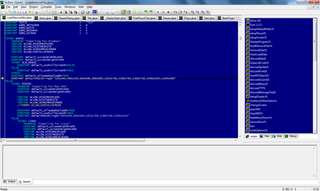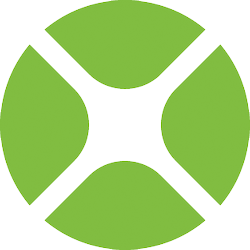Related Research Articles
In computing, cross-platform software is computer software that is designed to work in several computing platforms. Some cross-platform software requires a separate build for each platform, but some can be directly run on any platform without special preparation, being written in an interpreted language or compiled to portable bytecode for which the interpreters or run-time packages are common or standard components of all supported platforms.
C++Builder is a rapid application development (RAD) environment for developing software in the C++ programming language. Originally developed by Borland, as of 2009 it is owned by Embarcadero Technologies, a subsidiary of Idera. C++Builder can compile apps for Windows, iOS, macOS, and Android. It includes tools that allow drag-and-drop visual development, making programming easier by incorporating a WYSIWYG graphical user interface builder.
Xcode is Apple's integrated development environment (IDE) for macOS, used to develop software for macOS, iOS, iPadOS, watchOS, tvOS, and visionOS. It was initially released in late 2003; the latest stable release is version 15, released on September 18, 2023, and is available free of charge via the Mac App Store and the Apple Developer website. Registered developers can also download preview releases and prior versions of the suite through the Apple Developer website. Xcode includes command-line tools which enable UNIX-style development via the Terminal app in macOS. They can also be downloaded and installed without the GUI.
Object Pascal is an extension to the programming language Pascal that provides object-oriented programming (OOP) features such as classes and methods.

Free Pascal Compiler (FPC) is a compiler for the closely related programming-language dialects Pascal and Object Pascal. It is free software released under the GNU General Public License, with exception clauses that allow static linking against its runtime libraries and packages for any purpose in combination with any other software license.
37signals is an American web software company based in Chicago, Illinois. The firm was co‑founded in 1999 by Jason Fried, Carlos Segura, and Ernest Kim as a web design company.

Adobe AIR is a cross-platform runtime system currently developed by Harman International, in collaboration with Adobe Inc., for building desktop applications and mobile applications, programmed using Adobe Animate, ActionScript, and optionally Apache Flex. It was originally released in 2008. The runtime supports installable applications on Windows, macOS, and mobile operating systems, including Android, iOS, and BlackBerry Tablet OS.

MonoDevelop was an open-source integrated development environment for Linux, macOS, and Windows. Its primary focus is development of projects that use Mono and .NET Framework. MonoDevelop integrates features similar to those of NetBeans and Microsoft Visual Studio, such as automatic code completion, source control, a graphical user interface (GUI) and Web designer. MonoDevelop integrates a Gtk# GUI designer called Stetic. It supports Boo, C, C++, C#, CIL, D, F#, Java, Oxygene, Vala, JavaScript, TypeScript and Visual Basic.NET. Although there is no word from the developers that is has been discontinued, nonetheless it hasn't been updated in 4 years and is no longer installable on major operating systems, such as Ubuntu 22.04 and above. Its parent Microsoft, seems to have shifted focus to Visual Studio Code and the .NET Framework, which runs on many operating systems, including Linux.
The Android SDK is a software development kit that includes a comprehensive set of development tools. These include a debugger, libraries, a handset emulator based on QEMU, documentation, sample code, and tutorials. Currently supported development platforms include computers running Linux, Mac OS X 10.5.8 or later, and Windows 7 or later. As of March 2015, the SDK is not available on Android itself, but software development is possible by using specialized Android applications.

GLBasic is a commercial BASIC programming language that can compile to various platforms including Windows, Linux, Mac OS X, and some handheld devices. The language is designed to be simple and intuitive.
A mobile development framework is a software framework that is designed to support mobile app development. It is a software library that provides a fundamental structure to support the development of applications for a specific environment.
Apache Cordova is a mobile application development framework created by Nitobi. Adobe Systems purchased Nitobi in 2011, rebranded it as PhoneGap, and later released an open-source version of the software called Apache Cordova. Apache Cordova enables software programmers to build hybrid web applications for mobile devices using CSS3, HTML5, and JavaScript, instead of relying on platform-specific APIs like those in Android, iOS, or Windows Phone. It enables the wrapping up of CSS, HTML, and JavaScript code depending on the platform of the device. It extends the features of HTML and JavaScript to work with the device. The resulting applications are hybrid, meaning that they are neither truly native mobile application nor purely Web-based. They are not native because all layout rendering is done via Web views instead of the platform's native UI framework. They are not Web apps because they are packaged as apps for distribution and have access to native device APIs. Mixing native and hybrid code snippets has been possible since version 1.9.
RemObjects Software is an American software company founded in 2002 by Alessandro Federici and Marc Hoffman. It develops and offers tools and libraries for software developers on a variety of development platforms, including Embarcadero Delphi, Microsoft .NET, Mono, and Apple's Xcode.

Symbian is a discontinued mobile operating system (OS) and computing platform designed for smartphones. It was originally developed as a proprietary software OS for personal digital assistants in 1998 by the Symbian Ltd. consortium. Symbian OS is a descendant of Psion's EPOC, and was released exclusively on ARM processors, although an unreleased x86 port existed. Symbian was used by many major mobile phone brands, like Samsung, Motorola, Sony Ericsson, and above all by Nokia. It was also prevalent in Japan by brands including Fujitsu, Sharp and Mitsubishi. As a pioneer that established the smartphone industry, it was the most popular smartphone OS on a worldwide average until the end of 2010, at a time when smartphones were in limited use, when it was overtaken by iOS and Android. It was notably less popular in North America.

Xamarin is a Microsoft-owned San Francisco-based software company founded in May 2011 by the engineers that created Mono, Xamarin.Android and Xamarin.iOS, which are cross-platform implementations of the Common Language Infrastructure (CLI) and Common Language Specifications.

Mono is a free and open-source .NET Framework-compatible software framework. Originally by Ximian, it was later acquired by Novell, and is now being led by Xamarin, a subsidiary of Microsoft and the .NET Foundation. Mono can be run on many software systems.
Android Studio is the official integrated development environment (IDE) for Google's Android operating system, built on JetBrains' IntelliJ IDEA software and designed specifically for Android development. It is available for download on Windows, macOS and Linux based operating systems. It is a replacement for the Eclipse Android Development Tools (E-ADT) as the primary IDE for native Android application development.

The Xojo programming environment and programming language is developed and commercially marketed by Xojo, Inc. of Austin, Texas for software development targeting macOS, Microsoft Windows, Linux, iOS, Android, the Web and Raspberry Pi. Xojo uses a proprietary object-oriented language.
This page details the history of the programming language and software product Delphi.
References
- 1 2 RubyMotion - About. RubyMotion.com. Retrieved 2012-06-16.
- 1 2 Exclusive: building native iOS apps with RubyMotion. ArsTechnica.com. Published 2012-05-03. Retrieved 2012-06-16.
- ↑ Getting Started with RubyMotion. jetbrains.com.
- ↑ RubyMotion Goes 2.0 And Gets OS X Support, Templates and Plugins. RubyMotion.com. Retrieved 2013-06-16.
- ↑ Announcing RubyMotion 3.0: Android Platform, WatchKit Apps, and More. RubyMotion.com. Retrieved 2014-12-14.
- ↑ Why I loved building Basecamp for iPhone in RubyMotion. 37signals.com. Retrieved 2013-06-16.
- ↑ RubyMotion Success Story: Bandcamp. The RubyMotion Blog. Retrieved 2014-12-13.
- ↑ RubyMotion Success Story: A Dark Room. The RubyMotion Blog. Retrieved 2014-12-13.
